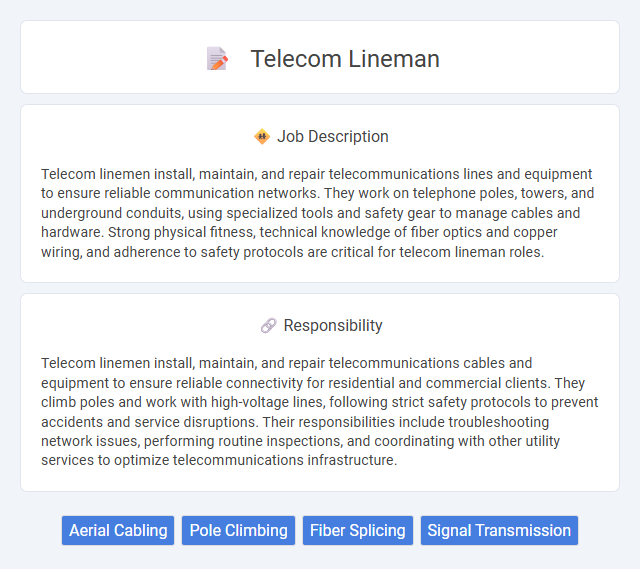
Telecom linemen install, maintain, and repair telecommunications lines and equipment to ensure reliable communication networks. They work on telephone poles, towers, and underground conduits, using specialized tools and safety gear to manage cables and hardware. Strong physical fitness, technical knowledge of fiber optics and copper wiring, and adherence to safety protocols are critical for telecom lineman roles.
Telecom lineman jobs often require physical strength, endurance, and the ability to work at heights, suggesting that individuals in good physical condition are more likely to be suitable candidates. People who are comfortable with outdoor environments and can handle potentially hazardous situations might have a higher probability of succeeding in this role. Those with strong problem-solving skills and the ability to work under pressure may also find this job more fitting to their capabilities.
Qualification
Telecom linemen require specialized training in electrical systems, fiber optics, and telecommunications infrastructure, typically obtained through technical schools or apprenticeships. Certifications such as OSHA safety standards and CPR are essential for working safely at heights and handling emergency situations. Strong physical fitness, mechanical aptitude, and knowledge of climbing equipment are critical qualifications for performing installation, maintenance, and repair of telecom lines efficiently.
Responsibility
Telecom linemen install, maintain, and repair telecommunications cables and equipment to ensure reliable connectivity for residential and commercial clients. They climb poles and work with high-voltage lines, following strict safety protocols to prevent accidents and service disruptions. Their responsibilities include troubleshooting network issues, performing routine inspections, and coordinating with other utility services to optimize telecommunications infrastructure.
Benefit
Telecom lineman jobs likely offer competitive salaries and overtime pay due to the demanding nature of the work. Employees may benefit from comprehensive health insurance, retirement plans, and opportunities for skill development that enhance long-term career prospects. Job security might be strong, given the essential role telecom linemen play in maintaining and expanding communication networks.
Challenge
Telecom linemen likely face physically demanding challenges that require working at great heights and in adverse weather conditions. The job probably involves complex problem-solving to maintain and repair communication lines promptly, minimizing service disruptions. Safety risks are significant, so strict adherence to protocols and continuous training is probably essential.
Career Advancement
Telecom linemen play a critical role in installing and maintaining communication cables and infrastructure, gaining valuable hands-on experience with electrical systems and safety protocols. Career advancement opportunities often include moving into supervisory roles, becoming a technical specialist, or transitioning into engineering or project management positions within telecommunications companies. Continuous training and certification in fiber optics, network technologies, and regulatory standards significantly enhance prospects for higher salary and leadership roles in the telecom industry.
Key Terms
Aerial Cabling
Telecom linemen specializing in aerial cabling are responsible for installing, maintaining, and repairing overhead communication lines that transmit data, voice, and internet signals. Skilled in climbing poles and operating aerial equipment, they ensure secure and efficient connections between network infrastructure and end users. Their work is critical for maintaining seamless service in residential, commercial, and remote areas.
Pole Climbing
Telecom linemen specialize in pole climbing to install, maintain, and repair communication cables and equipment at elevated heights. Mastery of safety protocols and the use of climbing gear such as hooks, belts, and harnesses are critical to prevent falls and ensure efficient workflow. Expertise in pole climbing enhances access to infrastructure in challenging terrains, supporting reliable telecommunications network performance.
Fiber Splicing
Telecom linemen specializing in fiber splicing install, maintain, and repair fiber optic cables that transmit high-speed internet and telecommunications signals. They use fusion splicing machines and precision tools to join fiber strands, ensuring minimal signal loss and optimal network performance. Expertise in fiber splicing enhances telecommunications infrastructure reliability and supports expanding broadband connectivity demands.
Signal Transmission
Telecom linemen specialize in installing, maintaining, and repairing overhead and underground telecommunications lines critical for signal transmission. Their work ensures uninterrupted data flow, voice communication, and internet connectivity by securing cables, transformers, and transmission equipment. Skilled in interpreting signal parameters and troubleshooting line faults, they play a vital role in optimizing network performance and minimizing downtime.
 kuljobs.com
kuljobs.com